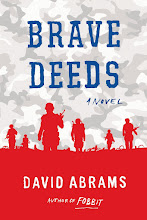There comes a jarring moment in every reader's life when he connects with an equally profound moment in the writer's life.
Let me start that again....
There comes a jarring moment in every writer's life when he connects with his reader in a moment of earthquake proportions. Invisible Writer meets Invisible Reader, shaking hands with an audible clap of flesh.
A word, a phrase, a sentence coils up from the page, snakelike, and leaps across the space between writer's finger and reader's eye.
For me, that happened when Manley Pointer put Hulga Hopewell's artificial leg in his valise and snapped the latches shut in Flannery O'Connor's "Good Country People." And it happened again in that chilling, devastating final line of Raymond Carver's "Popular Mechanics" when a man and a woman have a fight and involve their infant child in a literal tug-of-war: In this manner, the issue was decided.
In its most recent iteration, that author-reader frisson ran along my spine in the sixth paragraph of Tobias Wolff's short story "Bullet in the Brain." The story, which appears in Wolff's collection The Night in Question, begins with two sentences crammed with exposition:
Anders couldn’t get to the bank until just before it closed, so of course the line was endless and he got stuck behind two women whose loud, stupid conversation put him in a murderous temper. He was never in the best of tempers anyway, Anders – a book critic known for the weary, elegant savagery with which he dispatched almost everything he reviewed.In the course of the next four paragraphs, a bank teller closes her window. When the two women in front of him complain about it, Anders the critic makes a characteristic cutting remark. One of the women starts to take offense at his sarcasm and, by the time the fifth paragraph arrives, Wolff is well on his way to establishing narrative conflict and tension in a scene that's familiar to any of us who have stood in line at the bank (or grocery store or concert or DMV).
But then, but then....
Then comes the moment I was telling you about--that paragraph when the writer does something so marvelous that the reader immediately lifts the tablecloth and examines the inside of the top hat in an effort to see just how the magic was performed.
Warning: Spoilers ahead...
Anders has just none-too-subtly insulted the woman standing in line ahead of him and is watching for her reaction:
She sucked in her cheeks but stared past him and said nothing. Anders saw that the other woman, her friend, was looking in the same direction. And then the tellers stopped what they were doing, and the customers slowly turned, and silence came over the bank. Two men wearing black ski masks and blue business suits were standing to the side of the door. One of them had a pistol pressed against the guard’s neck. The guard’s eyes were closed, and his lips were moving. The other man had a sawed-off shotgun. “Keep your big mouth shut!” the man with the pistol said, though no one had spoken a word. “One of you tellers hits the alarm, you’re all dead meat. Got it?”What strikes me most about that paragraph is its focus. Instead of writing something like, "At that moment, two armed men in ski masks entered the bank and grabbed the guard," Wolff has us facing away from the action. Like Anders, we see what's happening as it's reflected in the expressions of the two women, then the tellers, and then as "the customers slowly turned" in the thickening silence. The threat of the armed robbers gradually seeps into the story, rather than coming at us with a banged-open door and voices yelling "Everybody on the floor!" as we've come to expect from the gospel according to Hollywood. And so, when the camera-eyes of the reader finally pan over to "the two men wearing ski masks and blue business suits," the chill is all that more sub-zero.
At this point, if you haven't already read "Bullet in the Brain," you probably should do so, because I'm about to lay some plot spoilers on you. It won't take long to read because it's a very short story--which makes its lasting echoes all the more remarkable. Here's a link (you'll have to overlook a few typos--but it's worth it):
As the action continues (with the Hollywood cliches of "Put the money in the bag," etc.), Anders' character is further revealed as a critic who just cannot stop, well, criticizing. As Wolff himself said in an interview with The Paris Review: "(The story is) about a book critic who is so jaded, and so filled with allusion and literary reference, that even when his very life is threatened he hears the threat as a series of clichés that he thinks are risible."
The tension mounts as Anders continues to flap his gums at the agitated bank thieves.
“Hey, you deaf or what?” The man with the pistol walked over to Anders. He poked the weapon into Anders’ gut. “You think I’m playing games?”
And then, and then...
Wolff takes the story in a new (and yet inevitable) direction altogether.
“Fuck with me again, you’re history. Capiche?”
Anders burst out laughing. He covered his mouth with both hands and said, “I’m sorry, I’m sorry,” then snorted helplessly through his fingers and said, “Capiche – oh, God, capiche,” and at that the man with the pistol raised the pistol and shot Anders right in the head.
Here is where I suspect "Bullet in the Brain" earns the reputation and popularity it so richly deserves. Wolff throws the entire story into slow motion (slower, even, than the car plunging off the bridge in the movie Inception--a three-second fall that director Christopher Nolan stretched to thirty minutes).
After striking the cranium the bullet was moving at 900 feet per second, a pathetically sluggish, glacial pace compared to the synaptic lighting that flashed around it. Once in the brain, that is, the bullet came under the mediation of brain time, which gave Anders plenty of leisure to contemplate the scene that, in a phrase he would have abhorred, “passed before his eyes.”
Even then, when given the opportunity to flash Anders' life before his eyes, Wolff once again confounds our expectations by giving us a long list of what the dying critic did not remember: the carnality of his first lover, his wife and her boring predictability, his daughter playing with her teddy bears, the "hundreds of poems he had conce committed to memory," etc. All of these unremembered memories deepen and widen our understanding of Anders, slowly melting us to something approaching sympathy.
Until finally we arrive at the one thing Anders does remember: a boyhood game of neighborhood baseball on a hot, insect-buzzed day when one of the regular players brings "a cousin of his from Mississippi," who is asked what position he wants to play: “Shortstop,” the boy says. “Short’s the best position they is.” And it is the sound of those last two words which captivates Anders then and in this last nano-second of his life.
Just as the carapaced critic, hardened against the humdrum joys of life, remembers a solitary moment when language first lit up his wonder and curiosity with the music of two words--they is--so I, too, am struck by the fresh surprises of Wolff's story. Here is a master playing with narrative as if it was a wind-up toy, releasing it across the floor and, just before it bumps into the wall, picking it up and turning it in a new direction, not once, but twice. Here is mastery of the form, here is a story wriggling to life and taking control of itself, here is the spark leaping from writer to reader and back again.
Photo credit: Annie Wells/LA Times














Great analysis of an ass-kicking story, David. He read it at The Story Prize event back in 2009 and it was a trip to hear it in his own voice.
ReplyDeleteyour dumb
ReplyDelete*You're dumb, dear
DeleteMy dumb what?
ReplyDeleteHaha to your question David. That is well deserved to Anonymous of Sept 13, 2012.
ReplyDeleteI think they are both good, the story itself and your analysis
ReplyDeletethank you!
You can watch Tobias Wolff reading "Bullet in the Brain": http://fora.tv/2009/03/04/The_Story_Prize_Awards_Ceremony_2009
ReplyDeleteIt starts around the 1:16:30 mark.
Thank you for this beautiful and insightful analysis. I found it by googling the author/story after reading it in the David Sedaris collection. I don't have anyone to discuss it with and had questions so I really needed this!
ReplyDeleteIt seems now that, at the moment of death, the brain may indeed release a chemical that expands time--hence the similarity of this story to William Golding's Pincer Martin and Ambrose Bierce's "Occurance at Owl Creek Bridge."
ReplyDeleteI have lately become familiar with the writings of Anthony Peake who has made the study of "brain time" something of a specialty. You might check him out. Peake is no Wo Wo proponent. His work is all based on reputable, if advanced, neuroscience and physics.
Great Great Great. One of my favorite short stories and you nailed why. Thanks for this.
ReplyDeleteThanks for all those terrific links, Sara. You really know how to kill a thread. Incidentally that tooth emoji reminds me of another incredible story, one by Lucia Berlin. Maybe when you need a break from posting adlinks on random comments threads you should take ten minutes and read Dr. H. A. Moynihan. It’ll knock your socks off.
ReplyDelete